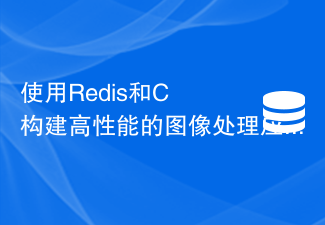 Backend Development
Backend Development C++
C++ Do C++ smart pointers have an impact on program performance, and if so, how are they measured and optimized?
Do C++ smart pointers have an impact on program performance, and if so, how are they measured and optimized?Smart pointers reduce the risk of memory leaks, but incur overhead. Different types of smart pointers have different overheads: std::unique_ptr is the lowest, std::shared_ptr is second, and std::weak_ptr is the highest. Benchmarks show that std::unique_ptr is slightly slower than raw pointers. Optimization measures include: using smart pointers with caution, using non-owning smart pointers, and avoiding deep copies.

The impact of C++ smart pointers on program performance
Smart pointers are a memory management tool that can help programmers avoid Memory leaks and invalid pointers. However, smart pointers also have some overhead, so it's important to understand their impact on program performance.
Overhead and Type
The cost of smart pointers varies between different types. The three most commonly used types are as follows:
-
std::unique_ptr: Only allows a unique pointer to point to a given memory block. This is the lowest overhead smart pointer type. -
std::shared_ptr: Allows multiple pointers to point to the same memory block. It is more expensive thanstd::unique_ptrbecause it requires tracking a reference count. -
std::weak_ptr: is a non-owning pointer and does not increase the reference count. It is more expensive thanstd::unique_ptrandstd::shared_ptrbecause it requires additional data structures.
Measuring Performance Impact
To measure the performance impact of smart pointers, you can use benchmarking tools. Here is a sample benchmark comparing the performance of creating and destroying objects using std::unique_ptr and raw pointers:
#include <chrono>
#include <memory>
int main() {
const int num_iterations = 1000000;
// 使用原始指针
std::chrono::time_point start = std::chrono::high_resolution_clock::now();
for (int i = 0; i < num_iterations; ++i) {
int* ptr = new int;
delete ptr;
}
std::chrono::time_point end = std::chrono::high_resolution_clock::now();
std::chrono::duration<double> raw_duration = end - start;
// 使用 std::unique_ptr
start = std::chrono::high_resolution_clock::now();
for (int i = 0; i < num_iterations; ++i) {
std::unique_ptr<int> ptr = std::make_unique<int>();
}
end = std::chrono::high_resolution_clock::now();
std::chrono::duration<double> smart_duration = end - start;
// 输出结果
std::cout << "Raw pointer duration: " << raw_duration.count() << " seconds\n";
std::cout << "Smart pointer duration: " << smart_duration.count() << " seconds\n";
}After running the benchmark, you will find that std:: unique_ptr is slightly slower than raw pointers. This is expected because std::unique_ptr has some additional overhead, such as tracking the object's lifetime.
Optimization
If the overhead of smart pointers becomes an issue, there are several optimization techniques to consider:
- Use smarts with caution Pointers: Use smart pointers only when needed. For example, if an object will live within the local scope of a function, it is better to use a raw pointer.
-
Using smart pointers without owning: Consider using
std::weak_ptras it is better thanstd::unique_ptrandstd: :shared_ptrhas less overhead. - Avoid deep copies: Copying a smart pointer container will cause additional reference count updates. If possible, use move semantics instead.
The above is the detailed content of Do C++ smart pointers have an impact on program performance, and if so, how are they measured and optimized?. For more information, please follow other related articles on the PHP Chinese website!
 Windows 11 系统下的五款最佳免费 C++ 编译器推荐Apr 23, 2023 am 08:52 AM
Windows 11 系统下的五款最佳免费 C++ 编译器推荐Apr 23, 2023 am 08:52 AMC++是一种广泛使用的面向对象的计算机编程语言,它支持您与之交互的大多数应用程序和网站。你需要编译器和集成开发环境来开发C++应用程序,既然你在这里,我猜你正在寻找一个。我们将在本文中介绍一些适用于Windows11的C++编译器的主要推荐。许多审查的编译器将主要用于C++,但也有许多通用编译器您可能想尝试。MinGW可以在Windows11上运行吗?在本文中,我们没有将MinGW作为独立编译器进行讨论,但如果讨论了某些IDE中的功能,并且是DevC++编译器的首选
 C++报错:变量未初始化,应该如何解决?Aug 21, 2023 pm 10:01 PM
C++报错:变量未初始化,应该如何解决?Aug 21, 2023 pm 10:01 PM在C++程序开发中,当我们声明了一个变量但是没有对其进行初始化,就会出现“变量未初始化”的报错。这种报错经常会让人感到很困惑和无从下手,因为这种错误并不像其他常见的语法错误那样具体,也不会给出特定的代码行数或者错误类型。因此,下面我们将详细介绍变量未初始化的问题,以及如何解决这个报错。一、什么是变量未初始化错误?变量未初始化是指在程序中声明了一个变量但是没有
 C++编译错误:未定义的引用,该怎么解决?Aug 21, 2023 pm 08:52 PM
C++编译错误:未定义的引用,该怎么解决?Aug 21, 2023 pm 08:52 PMC++是一门广受欢迎的编程语言,但是在使用过程中,经常会出现“未定义的引用”这个编译错误,给程序的开发带来了诸多麻烦。本篇文章将从出错原因和解决方法两个方面,探讨“未定义的引用”错误的解决方法。一、出错原因C++编译器在编译一个源文件时,会将它分为两个阶段:编译阶段和链接阶段。编译阶段将源文件中的源码转换为汇编代码,而链接阶段将不同的源文件合并为一个可执行文
 如何优化C++开发中的文件读写性能Aug 21, 2023 pm 10:13 PM
如何优化C++开发中的文件读写性能Aug 21, 2023 pm 10:13 PM如何优化C++开发中的文件读写性能在C++开发过程中,文件的读写操作是常见的任务之一。然而,由于文件读写是磁盘IO操作,相对于内存IO操作来说会更为耗时。为了提高程序的性能,我们需要优化文件读写操作。本文将介绍一些常见的优化技巧和建议,帮助开发者在C++文件读写过程中提高性能。使用合适的文件读写方式在C++中,文件读写可以通过多种方式实现,如C风格的文件IO
 C++编译错误:无法为类模板找到实例化,应该怎么解决?Aug 21, 2023 pm 08:33 PM
C++编译错误:无法为类模板找到实例化,应该怎么解决?Aug 21, 2023 pm 08:33 PMC++是一门强大的编程语言,它支持使用类模板来实现代码的复用,提高开发效率。但是在使用类模板时,可能会遭遇编译错误,其中一个比较常见的错误是“无法为类模板找到实例化”(error:cannotfindinstantiationofclasstemplate)。本文将介绍这个问题的原因以及如何解决。问题描述在使用类模板时,有时会遇到以下错误信息:e
 iostream头文件的作用是什么Mar 25, 2021 pm 03:45 PM
iostream头文件的作用是什么Mar 25, 2021 pm 03:45 PMiostream头文件包含了操作输入输出流的方法,比如读取一个文件,以流的方式读取;其作用是:让初学者有一个方便的命令行输入输出试验环境。iostream的设计初衷是提供一个可扩展的类型安全的IO机制。
 c++数组怎么初始化Oct 15, 2021 pm 02:09 PM
c++数组怎么初始化Oct 15, 2021 pm 02:09 PMc++初始化数组的方法:1、先定义数组再给数组赋值,语法“数据类型 数组名[length];数组名[下标]=值;”;2、定义数组时初始化数组,语法“数据类型 数组名[length]=[值列表]”。
 使用Redis和C++构建高性能的图像处理应用Jul 29, 2023 pm 08:36 PM
使用Redis和C++构建高性能的图像处理应用Jul 29, 2023 pm 08:36 PM使用Redis和C++构建高性能的图像处理应用图像处理是现代计算机应用中的重要环节之一。由于图像处理的复杂性和计算量大,如何在保证高性能的同时提供稳定的服务是一个挑战。本文将介绍如何使用Redis和C++构建高性能的图像处理应用,并提供一些代码示例。Redis是一个开源的内存数据库,具有高性能和高可用性的特点。它支持各种数据结构,如字符串、哈希表、列表等,同


Hot AI Tools

Undresser.AI Undress
AI-powered app for creating realistic nude photos

AI Clothes Remover
Online AI tool for removing clothes from photos.

Undress AI Tool
Undress images for free

Clothoff.io
AI clothes remover

AI Hentai Generator
Generate AI Hentai for free.

Hot Article

Hot Tools

DVWA
Damn Vulnerable Web App (DVWA) is a PHP/MySQL web application that is very vulnerable. Its main goals are to be an aid for security professionals to test their skills and tools in a legal environment, to help web developers better understand the process of securing web applications, and to help teachers/students teach/learn in a classroom environment Web application security. The goal of DVWA is to practice some of the most common web vulnerabilities through a simple and straightforward interface, with varying degrees of difficulty. Please note that this software

Atom editor mac version download
The most popular open source editor

Dreamweaver Mac version
Visual web development tools

PhpStorm Mac version
The latest (2018.2.1) professional PHP integrated development tool

SecLists
SecLists is the ultimate security tester's companion. It is a collection of various types of lists that are frequently used during security assessments, all in one place. SecLists helps make security testing more efficient and productive by conveniently providing all the lists a security tester might need. List types include usernames, passwords, URLs, fuzzing payloads, sensitive data patterns, web shells, and more. The tester can simply pull this repository onto a new test machine and he will have access to every type of list he needs.





